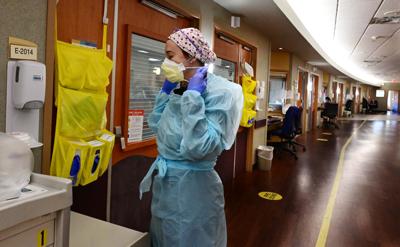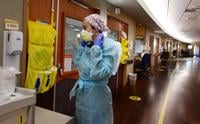A record 11,663 El Paso County residents have tested positive for the coronavirus in the last week, close to double the number of cases the county saw a week ago.
"We are seeing cases and positivity at stratospheric levels," said Dr. Michael Roshon, an emergency room physician with Penrose-St. Francis and the vice president of research operations for Centura.
On average in El Paso County, 32% of those tested are positive, Tuesday data showed, far above the 5% positivity rates communities have aimed for since the beginning of the pandemic to keep the virus in check.
While case numbers are soaring and likely to keep rising in the coming days, the omicron variant is causing less severe sickness and a far smaller percentage of people are needing hospital care than during the delta variant-driven spike in cases.
El Paso County and Colorado hospitals say they can likely absorb the surge in demand for hospital care expected in the coming days, despite staffing shortages, without rationing care.
Locally, hospital officials have made changes to protect their capacity such as delaying procedures, staffing up and putting surge plans in place.
"We are in a better place than we were when delta hit us at its hardest," said Dr. David Steinbruner, chief medical officer for UCHealth Memorial Hospital Central and Memorial Hospital North.
In El Paso County demand for hospital care is up slightly, with 193 patients in need of COVID-19 care Tuesday. The last time county hospitals were caring for more than 200 patients was mid December during the delta-driven spike. The county peak was Nov. 18, when 237 patients needed COVID care.
Across the state, as of Wednesday, more Coloradans were hospitalized with COVID-19 than in November 2021, when hospital capacity was at its most critical point of the pandemic.
Rachel Herlihy, Colorado's state epidemiologist, told reporters Wednesday that 1,577 people are hospitalized with COVID-19, one more than the Nov. 23 high. Since Christmas Day 585 people infected with the virus have been admitted to the hospital, and the steep incline has yet to show signs of slowing.
New modeling from researchers at the Colorado School of Public Health, presented by Herlihy, indicate a number of scenarios for the state's hospitals in the coming weeks. Herlihy said it was "likely" that Colorado would end up somewhere between two of them: one it's already surpassed, of 1,479 patients by Jan. 11, and the other that's much higher, 2,144 patients by Jan. 15.
The state's overall record for most COVID-19 patients at one time is 1,847, set on Dec. 1, 2020.
A large percentage of those patients, however, have COVID-19 as a secondary condition or "incidental infection" because it is spreading so fast.
Herlihy said preliminary data indicates that 65% of patients currently hospitalized with COVID-19 in Colorado are there because of the virus. The remaining 35% are "incidental" cases, meaning the patients may have gone to the hospital for another reason and tested positive subsequently. The ratio in previous waves, Herlihy said, was between 80% and 90% of COVID-positive patients hospitalized for the virus.
At UCHealth, for instance, roughly a third of the 362 patients hospitalized with COVID-19 are being treated for complications from the virus, said Michelle Barron, the system's senior medical director of infection prevention and control. She compared that to August 2021, when only three of 80 COVID-19 patients had incidental cases.
That does not mean, Herlihy and others said, that those "incidental infections" can simply be discounted. Herlihy said that infections in other patients may complicate their other condition; it complicates their treatment, as they need to be isolated; and it may extend their length of stay.
COVID-19 infections "continue to be a significant strain on the health care system," she said.
In El Paso County Roshon said he expected the community would see cases increase for another week and that the high volume of cases could translate into greater hospital demand that could challenge local capacity.
"I think it’s going to be close," he said.
To help ease some staffing needs, the state sent about 30 registered nurses, certified nursing assistants and respiratory therapists from the Federal Emergency Management Agency to Penrose Hospital. They're expected to stay about three weeks.
"It has been a godsend. It’s one of the reasons we are not over capacity," he said of the additional staff.
UCHealth has also staffed up, hiring many new graduates and offering incentives to encourage staff to stay, Steinbruner said. Still hospital systems have had trouble competing with the pay available to nurses who choose to work for travel agencies, he said.
Primary care offices have also been busy, with the thousands of mild and moderate coronavirus cases in the county. Many of them are break-through cases, said Dr. Richard Vu, founder of Matthews-Vu Medical Group.
"We have lots and lots of people testing positive for COVID, and most of them, I would say, more than 90% of those positive cases have mild to moderate disease and we can manage them at home. ... Not surprisingly many of those people have already been vaccinated," he said. Some folks coming down with the virus have also received a booster shot, he said.
His clinics are using monoclonal antibody treatments on a first come, first served basis because they need to be used early on in the disease progression to be effective.
The Centers of Disease Control and Prevention recommend prioritizing the treatments for those who are highest risk, but that is just not practical, he said.
"If we prioritize, then we lose time. ... If we lose time, then we lose effectiveness," he said.
The community is also seeing a high level of other viruses that did not circulate as much last winter, such as colds and parainfluenza, he said, urging residents to get tested to see if their mild symptoms are coronavirus.
Such widespread but largely mild sickness in the community and nationally could be a step toward the virus becoming more endemic, similar to the flu, as more people develop immunity, several local health providers said.
"I think we have gotten through the worst," Steinbruner said.
The coronavirus could also mutate into a variant that is highly transmissible like omicron, but more deadly, Vu said.
El Paso County Spokeswoman Michelle Beyrle urged residents to get vaccinated, wear masks in indoor settings, stay home when sick and limit large indoor gatherings to help slow the spread of the virus.






 Your Privacy Choices
Your Privacy Choices